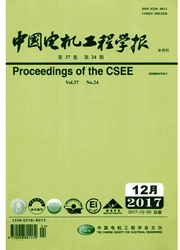

 中文摘要:
中文摘要:
混合磁悬浮装置的各项参数相互影响,决定着整个装置的性能。在满足承重要求的条件下,有必要对该装置的各项参数进行优化研究。为此,提出一种多策略改进粒子群算法,并将其应用到混合磁悬浮承重装置的参数优化中。首先,对混合磁悬浮装置进行介绍,通过分析永磁和电磁悬浮力,以励磁损耗和资金投入最小,和在允许范围内减载程度最高为目标,建立该装置的优化模型。在算法上,通过分析传统粒子群算法的缺陷,首次提出多开端策略来提高种群的多样性,结合反向学习和参数修正等多种策略对粒子群算法进行改进(多策略改进粒子群算法),以广义Schwefel函数为验证函数,通过与其他粒子群算法的比较证明,改进算法具有更强的优势。最后,运用多策略改进粒子群算法对磁悬浮模型进行优化,将优化结果与原有参数进行比较,分析可知该结果更加符合实际情况,通过仿真验证该结果的合理性,为进一步建立实验模型奠定了理论基础。
 英文摘要:
英文摘要:
The mutual influences among the parameters of hybrid magnetic levitation devices determine the device performances. When the load-reduction requirement is met, it is necessary to optimize structural parameters of the devices. A novel improved multi-strategy particle swarm algorithm is proposed, and is applied on the structural optimization of devices. Firstly, the principle of devices is introduced, the electromagnetic force and permanent magnetic force are analyzed. Based on the idea of minimal electromagnetic loss and investment minimum, and maximal load-reduction degree within the scope allowed, optimization objective functions of the devices are built. Then, by analyzing the defects of the traditional particle swarm algorithm, this paper proposes a multi-start strategy to improve the diversity of the swarm. The technology combines with opposition-based learning and parameter correction to improve the particle swarm algorithm(i.e. improved multi-strategy particle swarm algorithm). To verify the rationality of the improved strategies and its effectiveness of the improved algorithm, the generalized Schwefel function is taken as the test function, solutions are compared with other particle swarm algorithms, the result is proven that the improved algorithm has more superiority. Finally the improved multi-strategy particle swarm algorithm is applied to optimize the model. Through compared the optimization results with original parameters, it is concluded that the results are more practical on space utilization, which is verified by FEM. The results lay theoretical basis for further establishment of experimental models.
 同期刊论文项目
同期刊论文项目
 同项目期刊论文
同项目期刊论文
 期刊信息
期刊信息
